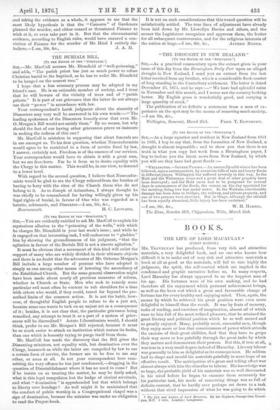[TO THE EDITOR OF THE"SPECTATOR."]
Sin,—You are evidently entitled to ask Mr. MacColl to explain his mysterious allusion to the "poisoning of the wells," with which le charges Mr. Blomfield in your last week's issue ; and while he is engaged on that interesting task, I will endeavour to "gladden" him by showing the groundlessness of his judgment, "that the agitation in favour of the Burials Bill is not a sincere agitation."
It must be obvious that a movement of this kind will enlist the support of many who are widely divided in their ultimate objects and there is no doubt that the advocates of Mr. Osborne Morgan's Bill include a large number of persons who have adopted it -simply as one among other means of lowering the ascendancy of .the Established Church. But the same general observation might have been made about nearly all previous measures of reform, whether in Church or State. Men who seek to remedy some particular evil must often be content to rub shoulders for a time with others who would, if they could, travel far beyond the pre- scribed limits of the common action. It is not the habit, how- ever, of thoughtful English people to refuse to do a just act, 'because some one wants to tack on an unjust act as a consequence of it ; besides, it is not clear that, the particular grievance being remedied, any attempt to treat it as a part of a system of griev- -ances will be discredited? Astute Liberationists would, I should think, prefer to see Mr. Morgan's Bill rejected, because it must be so much easier to attack an institution which nurses its faults, than one which is honestly trying to purge itself from them.
Mr. MacColl has made the discovery that the Bill gives the Dissenting ministers, not equality with, but domination over the -Clergy, inasmuch as while the latter are compelled by law to use certain form of service, the former are to be free to use any .other, or none at alL Is not your correspondent here com- mitting the very offence he has just condemned,—dragging in the -question of Disestablishment where it has no need to come? But if he insists on so treating the matter, he may be fairly asked, what is this legal compulsion but the badge of clerical servitude, and what " domination " is apprehended but that which belongs to liberty over bondage ? As well might it be maintained that the conduct of public worship in a Congregational chapel was a sign of domination, because the minister was under no obligation to read the Prayer-book. It is not on such considerations that this vexed question will be satisfactorily settled. The true lines of adjustment have already been laid down by Mr. Llewellyn Davies and others, and the sooner the Legislature recognises and approves them, the better for all subsequent controversies, and for the religious interests of the nation at large.—! am, Sir, &c., ALFRED NODES.


































 Previous page
Previous page